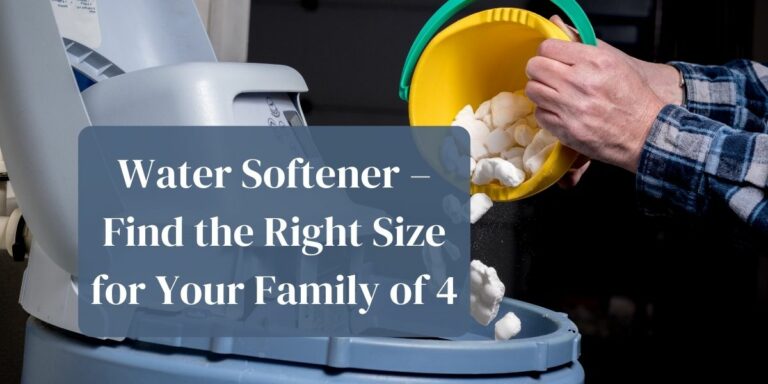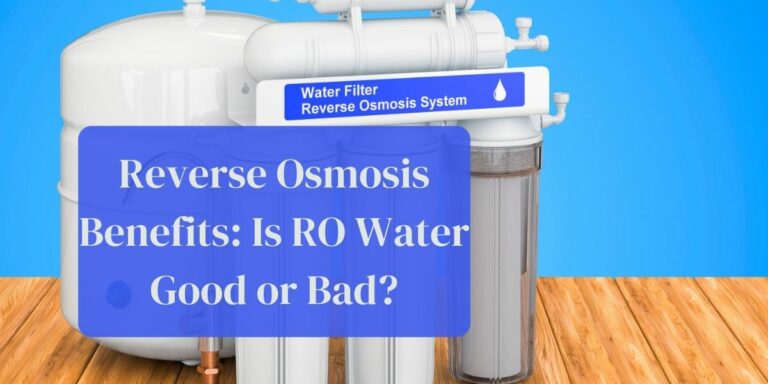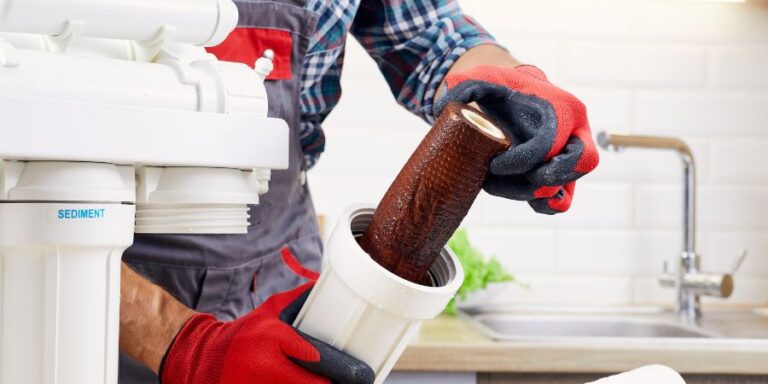In this modern day and age, a lot of people have zero problems drinking water from the tap. That being said, that does not mean that your water supply is completely flawless. In fact, water can sometimes taste unusual.
One of the common problems you may encounter is water having a metal taste. So, what causes a problem like this? And is there anything you can do about this metal taste? Be sure to read on to find out.

Table of Contents
- Why Does Water Taste Metallic?
- How Do I Test My Water Supply?
- What Can I Do If My Water Supply Has A Metallic Taste?
- What If The Metallic Taste Is Not Caused By The Water?
Why Does Water Taste Metallic?
Your water supplier can add a number of chemicals to your drinking water. Naturally, these chemicals are safe to drink under current laws. That being said, certain chemicals put inside water can react with your plumbing and give your water a metallic, bitter taste.
One of the chemicals that can react with the plumbing in your home is chlorine. In fact, some homeowners will not describe it as a metallic taste, but as a chlorine taste. In this case, the cause of the metallic taste is pretty obvious.
In addition to the interactions of chlorine, there are minuscule amounts of metals in your drinking water. These trace metals often come from plumbing; this can include copper, iron, lead, nickel, and manganese. If your plumbing is relatively old, this could also explain why your drinking water tastes like metal.
So, what about people who live in newly built homes? Does this mean they cannot get water that tastes a little metallic? They still can. However, the cause is often down to chlorine interaction or due to the fact you are getting so-called soft water.
How Do I Test My Water Supply?
When you want to test your water supply, the first thing you need to ask yourself is what will you be testing your water for. There can be many contaminants in the water, even in water that is considered safe for consumption.
There are independent services you can obtain to test your water supply, which can provide you with a detailed overview of contaminants over the course of time. In addition to that, you can also obtain individual test kits, which can test your drinking water for certain chemicals such as chlorine, but also for pesticides, lead, and bacteria.
Before you use a test kit, it is certainly recommended to test the accuracy of the test kit and its reputation. Not all test kits are accurate, and some have a poor reputation when it comes down to delivering accurate results. So, always check out the various options online before you commit to a specific brand.
- 17 IMPORTANT PARAMETERS: The Varify Premium Drinking Water Test Kit offers an unrivaled, complete analysis of your drinking water by testing for 17 essential parameters. This includes crucial tests for chlorine, fluoride, lead, iron, bacteria, and more, ensuring that you're fully informed about the quality of your water. With this extensive range of testing capabilities, you can detect contaminants and imbalances that could affect your health, providing a holistic view of your water's safety.
- PREMIUM QUALITY: Varify stands out with its professional-grade quality, ensuring that every test strip in the kit meets the standards of precision and reliability. Crafted with meticulous attention to detail, this kit is designed to provide you with a dependable and thorough analysis of your water's composition.
- EASY TO USE: Varify's water test strips and Bacteria Test kits feature a user-friendly, color-coded system for quick and precise water quality assessments. With clear color changes indicating various parameters, these strips make complex data easily understandable, ensuring you can evaluate your water's safety effortlessly in just minutes.
- ACCURATE AND RELIABLE: Varify's water test kit comes with 100 strips in 5 separately sealed pouches (20 strips each), preserving freshness and extending shelf life for dependable testing. It also includes 2 easy-to-use bacteria tests that deliver results in 48 hours, ensuring thorough and accurate assessment of your water's safety and cleanliness. This design ensures precision and convenience in monitoring your water quality.
- WATER TESTING KITS THAT GIVE BACK: With every Varify test kit, not only do you secure the safety of your drinking water with our precise and easy-to-use testing solutions, but you also contribute to a global cause. A portion of proceeds goes to Water For Good, fighting water poverty in Central Africa. This means each test not only brings peace of mind to you but also supports #CleanWaterWorldwide, making a real difference in communities in need.
What Can I Do If My Water Supply Has A Metallic Taste?
While a metallic taste in the drinking water can be an inconvenience for those who drink their tap water, it usually is no cause for concern. Your drinking water provider has to test your water supply on a regular basis, so drinking water should always be safe to drink.
Naturally, if the metallic taste of the water seriously bothers you, there are some things you can do about it. The first point of reference is looking at the age of the plumbing inside your home. If you are not quite certain about the age of the plumbing, you could also look at the overall age of the home. In most cases, the age of the plumbing coincides with that of the house.
Replacing the entire plumbing system inside your home can be quite an investment, but for older homes that is usually one of the solutions that will be put forward. That being said, metallic water may be limited to one of the taps inside your home. In this case, you need to look at the problem in a more local manner.
When a specific tap in the home is responsible for producing water with a metallic taste, it is a good idea to look at taps that contain either a synthetic or a non-phenolic washer.
You could also choose a tap with a higher-quality filter, which enables the removal of those trace metals we mentioned earlier. It can also be an alternative to replacing the entire plumbing system in your home. That being said, always consider that a filter on your tap can only do so much, especially if your home?s plumbing is quite old.
What If The Metallic Taste Is Not Caused By The Water?
A metallic taste in the mouth is not necessarily caused by the water, as this is also a common symptom people experience. In most cases, it is a reaction to something. To ensure you have a full overview of the possible causes, we have described the most common causes of a metallic taste in the mouth below.
Oral hygiene
If you have poor oral hygiene, the metallic taste in the mouth could be caused by some dental issues. For example, anyone who suffers from gum problems and tooth infections are likely to experience the metallic taste in the mouth. However, once the oral problems disappear, the metallic taste will go too.
Medications and supplements
There are a number of medications and supplements that could cause a metallic taste in the mouth too. Common medications that are known to cause this side-effect include tetracycline, allopurinol, and many mental health medications such as anti-depressants. When a medication can dry out the mouth and cause problems with your taste buds, it usually falls into the category of medications that cause a metallic taste in the mouth.
Taking certain vitamins and supplements can have a similar effect on the body. For example, if you take a multivitamin with lots of copper, zinc and chromium, then a metallic taste in the mouth could most definitely occur.
Upper respiratory infections
Since upper respiratory infections can influence your sense of smell and taste, they can also create a metallic taste in the mouth. Evidently, it means that a metallic taste in the mouth could occur throughout an upper respiratory infection. However, it usually disappears as soon as the infection subsides.
Chemotherapy or radiation
Cancer treatments can have some serious side-effects. One of the side-effects that may occur as a result of chemotherapy or radiation is a metallic taste in the mouth. Even though physicians will attempt to reduce side-effects from chemotherapy as well as radiation, a metallic taste in the mouth is one of those side-effects that is difficult to address.
Dementia
It is less known that dementia can cause a metallic taste in the mouth as well. When someone suffers from dementia, the brain becomes affected. The taste buds are connected to the brain by certain nerves. When those nerves or that part of the brain becomes impacted, then dementia sufferers can experience the described metallic taste.
When You Should Speak To Your Doctor
If you have eliminated the possible causes of the metallic taste in your drinking water, and if it is a problem you alone seem to experience, it is always best to speak to your physician.
Remember, a metallic taste can have an underlying cause, which can be medical in nature. So, when in doubt about the cause of the metallic taste, always get checked out by a doctor to rule out any serious conditions underneath.









